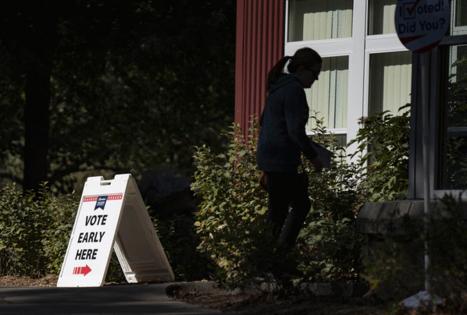Editorial: Election results may take time. That's a fact, not grounds for conspiracy theories
Published in Political News
Election day is almost here, and the end of this tumultuous campaign season cannot come soon enough. But it may not come Tuesday night.
Given that the race for president is expected to be close, it’s quite possible that Americans will have to wait days to learn whether Vice President Kamala Harris or former President Donald Trump will be the next commander in chief. Vote counting may take a while, and — despite what bad-faith actors might suggest — that’s OK. A healthy democracy can afford to be meticulous in counting every vote and patient in waiting for accurate results.
In 2020, Trump cynically and dangerously claimed that legitimate delays to count a record number of mailed ballots were evidence of fraud and asserted that Democrats were “trying to steal the election.” Trump’s lies were debunked and rejected by judges in numerous court cases, but his misinformation campaign persuaded thousands of people to show up to his “Stop the Steal” rally on Jan. 6, 2021, and storm the Capitol in an effort to prevent Congress from certifying the election results.
This year, election officials (both Republicans and Democrats among them) have been trying to reset expectations of how quickly votes can be counted in an attempt to tamp down conspiracy theories.
Here are the facts:
More states, including California, have expanded the use of mail-in ballots and ballot drop boxes, which are more convenient for voters. These ballots take longer to count because election personnel verify signatures on ballot envelopes against state records.
States have different rules that may affect the speed of their counts. Pennsylvania, for example, does not allow election workers to begin processing mail ballots until election day. North Carolina is requiring a photo ID to vote this year, which is expected to increase the number of provisional ballots that have to be researched to determine eligibility, which takes time.
In 2020, Trump made the absurd and laughably ignorant assertion that ballots counted after election day aren’t legitimate. Election officials do not — and should not — stop tallying votes after 11:59 p.m. on Tuesday. That would be impractical and unfair. And no election has ever been certified on election day.
Some politicians, pundits and even media outlets may choose to “call” a race based on early returns, but that’s often irresponsible. The results can shift as ballots are counted. In the 2018 midterm election, early returns had Republican candidates leading in some key California congressional races. That turned out to be a “red mirage”: When all the ballots were counted, Democrats won the seats and control of the House. At the time, some Republicans suggested that the reversal of fortune was an indication of some type of election misconduct. It wasn’t. Election officials were simply doing their jobs and ensuring that every vote was counted.
This is a politically fraught moment. Foreign powers and opportunists have already been spreading disinformation to undermine confidence in the election. Last week, U.S. intelligence agencies blamed Russia for a viral video purporting to show a Haitian immigrant with multiple Georgia IDs claiming to have voted multiple times. Russia is also allegedly responsible for a fake video that purports to show someone destroying ballots marked for Trump in Pennsylvania.
That’s why it’s so important to rely on facts, verifiable information and reliable sources such as the National Assn. of Secretaries of State, whose members run elections, and to be a discerning consumer of social media, where so many false claims circulate.
This year’s election will test Americans and our democratic institutions. Let’s do everything possible to ensure we pass.
©2024 Los Angeles Times. Visit at latimes.com. Distributed by Tribune Content Agency, LLC.




























































Comments